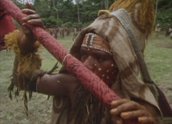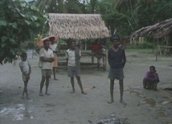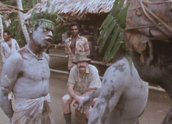


Man Without Pigs (1990)
Synopsis
John Waiko is the first Papua New Guinea man to graduate with a PhD and be appointed a professor. He returns to the Binandere clan and his small village of Tabara in the Northern Province of PNG. Once there, he has to organise a celebration for his achievements with his family’s help. Since he has been away for most of his life, he has no recognised wealth in the village (the pigs used for gift giving), nor a network of supporters or knowledge of the preparation and rituals for having such a celebration. He wants the event to happen quickly but that’s not the way it works in Tabara. Man Without Pigs focuses on the antagonism aroused by the clash between traditional customs and Western values in this remote PNG community.
Curator’s notes
Chris Owen, the director-cinematographer, and Andrew Pike, the sound recordist, came with Waiko with plans to make a documentary around Waiko’s PhD thesis, the subject being the spiritual values that are attributed to the endangered rainforests. But when they arrive, high drama ensues about rituals that were not being strictly followed by Waiko. Owen and Pike start filming what is occurring in the village and their footage becomes this remarkable documentary, Man Without Pigs
It is filmed in an observational style, with some historical footage and interviews. In the title sequence, Waiko is walking around the village speaking loudly, seemingly to no one. Juxtaposed with this scene is historical footage of Waiko being introduced and then speaking confidently to a large group of people at the Australian Museum. At the end of his speech, he bursts into song and it is very powerful. The film, right up front, is signifying that it will deal with this man’s conflict between two cultures (see clip one).
Chris Owen says his film is about ‘the complexity of village politics and the enormous demands and expectations on a person like Waiko’. Since childhood, John Waiko had not lived in this community, where position and wealth are measured by how many pigs a person owns, where money is not exchanged and strict rituals must be followed (see clip two).
Some of the villagers thought that Waiko was acting like a ‘big man’ when he didn’t have any pigs to justify his status. A ‘big man’ in PNG is a very influential person in a clan and very skilled at dramatic oratory. Hank Nelson, Waiko’s academic advisor at ANU, states in the film that very few people feel at home in two cultures. John’s family also want him to be a man of status within the village and his rivals want him to carry their message to the outside world.
Nelson was invited to Tabara as a guest of honour and ended up being an anthropologist commentator on John Waiko’s dilemmas in the film. He comments on the traditions, culture, rituals and the farcical dramas, which take many forms and can be extremely humorous (see clip three). At the end, the film comes back to the predicament of the rainforests and the importance of protecting them and saving the clan’s cultural dances and stories – all of which Waiko is passionate about. The dance that becomes part of the celebration has not been performed in Tabara since the 1920s.
Owen is Australian and specialises in ethnographic filmmaking. He has been involved in one way or another in almost every documentary made about Papua New Guinea since 1980 when he became director of the film unit at the Institute of PNG Studies in Port Moresby. He has collaborated with other Australian documentary filmmakers such as Bob Connolly and the late Robin Anderson, Dennis O’Rourke and Gary Kildae.
In 1990 Man Without Pigs won the International Jurors’ Prize at the Sydney Film Festival and Best Documentary at the Hawaii International Film Festival.
- Overview
- Curator’s notes
- Video 3 clips
- Principal credits
- Find a copy
- Make a comment
- Map
- Add your review



